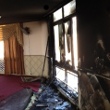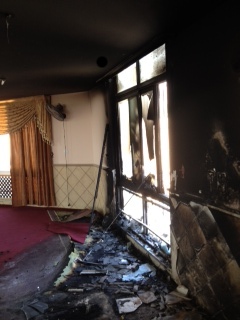Home > Oasis of Peace > Community > Jaba Burning: a solidarity visit to a Palestinian village
Jaba Burning: a solidarity visit to a Palestinian village
Monday 25 June 2012, by

On Saturday June 24, 2012 a delegation from WAS-NS visited the Ramallah district village of Jaba. The visit was meant to express support for the residents of the village, whose mosque had been torched in an attack earlier that week. During the visit we met with the head of the council and local people from the village. We visited the mosque, received an explanation on the status of the village lands and heard about life under Israeli occupation. The chair of WAS-NS’s municipal council invited our Palestinian hosts to visit us, as soon as the walls and barriers that prevent them can be speedily removed.
I thought we were going on a solidarity visit. Jaba’s mosque was set on fire earlier this week (6/19/2012). On its walls were sprayed the words: "War", "Ulpana" (an Israeli outpost settlement faced with evacuation) and "Price Tag". Acts of violence by Jewish civilians or soldiers are a matter of routine in Palestine, but this time the proximity of the attack to the one the week before in WAS-NS had created a sense of partnership, if only for a moment.
On the way there, we talked about the visit and agreed that our main purpose would be to show support and indicate that government policy and the occupation are to blame for the attack. The evening before, by strange coincidence, I saw on TV the movie Mississippi Burning. Racism against blacks, violence sponsored by the local authorities but unlike our reality, the movie included determined FBI investigators who find the culprits.

When we arrived, Jaba village council head Muhammad Abd Al-Karim A-Besharat greeted us and showed us the mosque and the slogans. I thought that the attack on the mosque was the main story, but gradually it became clear that this was only a disturbance to the routine hardships endured by this Palestinian village.
The village has a population of 4,200 and is on the site of the Biblical town of Gibeah. Our hosts related the history of the place, including the tale of the concubine of Gibeah – a horrible story, as Muhammad said. He explained the ancient history and told us about archaeological finds discovered in the area. He did not skip any historical period. The hills in the region have seen many peoples and cultures. He had not the least anxiety that any of these facts would undermine Palestinian identity with the place. Previously we have sometimes heard a historical narrative that leaves out the history of the Jews; in the same way that Zionists will gloss over historical episodes they find to be inconvenient.
We stood facing the landscape to the north. Below us were the settlements of Migron, Sha’ar Binyamin, Psagot, and a supermarket of Rami Levi at the foot of the hill. On the horizon we could see Ramallah. From the village’s original 2,400 hectares of land, 2,200 have been stolen for the benefit of Israeli settlers. The case of Jaba’s lands has been stuck in an Israeli court since 1994. This 18-year inaction by the court permits ongoing Jewish settlement activity and continued injustice. I thought how strange it is to appeal to the thieves for justice. Muhammad seemed to divine the direction of my thoughts and he explained that, despite their misgivings, appeal to an Israeli court was the only option open to them. Regarding the separation wall they were able to turn instead to the International Court of Justice in the Hague. In the case of land expropriation, there is no such possibility.
Since the villagers are no longer able to make a living from the land, some work in the settlements- thus opposing the Palestinian call for boycott. "A man’s first necessity is to put bread on the table," explained our hosts. I recalled a recent debate in WAS-NS over the question of whether we should support the cultural boycott of Israel. When it comes to considerations of bread and livelihood, it is hard to argue. But here in Israel, we have more options; so I believe we need to continue this debate.
The council head emphasized that they had chosen a legal struggle over one of popular protest. However, he fears that the strategy of nonviolent resistance now prevailing in Palestine will not last long: "No one can remain in a position of weakness forever."
The welcome we were given and the profuse thanks we received were embarrassing: this should have been a simple act of support: Jews and Arabs arriving from Israel. Yet this mundane and human act had become something miraculous. The wall, the checkpoints and the mechanism that determines who will receive permits are effective and ingenious methods of control. They create a division that prevents the formation of any joint opposition to government policy. As a simple, polite gesture we invited them to reciprocate our visit; an invitation which cannot be fulfilled of course. All supporters of the wall and fence can sleep soundly. The system works. The two peoples are separated. There are still a few gaps in the almost complete division, but the psychology of fear that is fostered by the government effectively seals these as well.
Our hosts told us that this is not the first time they have experienced harassment. There have been previous attacks and vandalism – though not to the mosque. A previous highlight was when unknown persons, in the hope of assailing Muslim sentiments, released a truckload of pigs in the village center.
After a tour, on entering the council head’s house, my vision darkened. Hanging there were the photos of two boys, his son and nephew, both killed by soldiers in 2008.
Layers of loss, pain and injustice were revealed on this visit: the burned mosque, the stolen land, the warped justice, and bereavement. The story of a small village in on the road to Ramallah.
When I was leaving, the grandmother stood at the door and kissed me, blessing my family. There were tears in our eyes as she thanked me for visiting. Once I would have felt shame, but no longer. Today I am mostly angry and searching for ways to create solidarity with the oppressed.